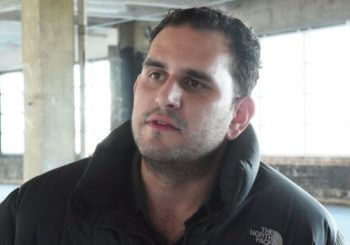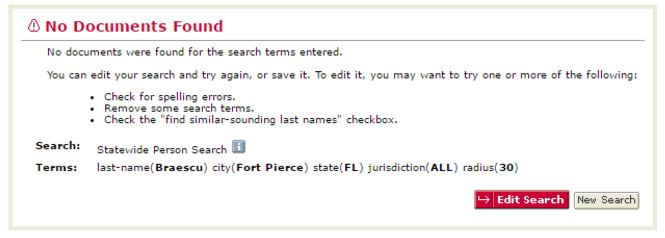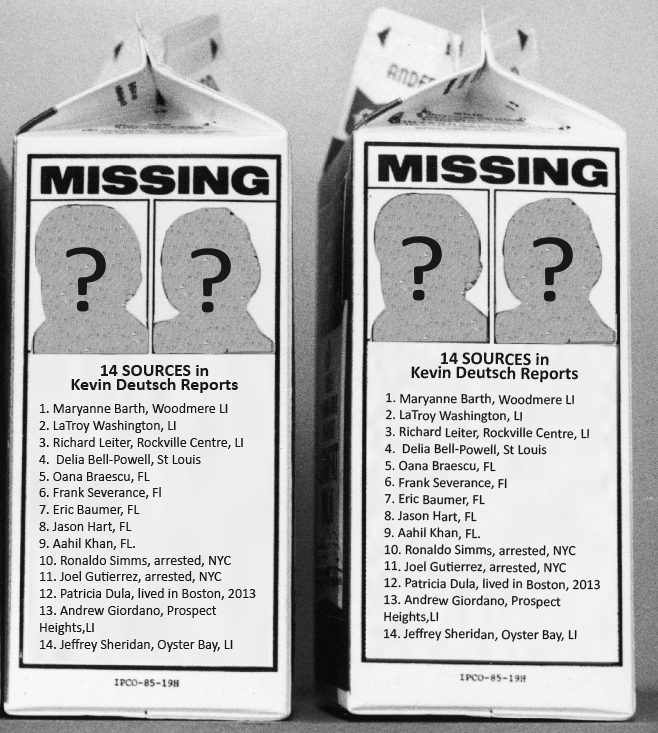
The Baltimore Sun first reported questions about Kevin Deutsch's book Pill City and interviewed him in person. (Screenshot/The Baltimore Sun)
2 neighbors from 1 Newsday story on Orlando Pulse shooter Mateen.
5. Oana Braescu, neighbor
Who: In one of two news stories by Deutsch about the Orlando Pulse nightclub shooter Omar Mateen who killed 49 people last year, he reported on Mateen’s psychology. Deutsch parachutes into Orlando and within hours out-reports all the local, national and international journalists as he uniquely is able to quickly discover multiple sources who knew the shooter, including 32-year-old Oana Braescu, a neighbor of Mateen. Breascu “lived next to the couple’s Fort Pierce home in 2009,” Deutsch reported.
Braescu, who no other news reporter interviewed, told Deutsch details from seven years earlier about how Mateen fought with and screamed at his wife. “He’d scream and scream,” and one time, Braescu is quoted, “I could hear her asking him to stop hitting her…There was something the matter there, in his head.” The interview was exciting as Braescu had insight into the killer’s state of mind, “I was thinking, this person is dangerous.”
Where: Newsday June 13, 2016
Problem: iMediaEthics searched LexisNexis public records. Not only is there no Oana Braescu listed as living in Fort Pierce, as Deutsch alleges, there is no one with the last name of Braescu recorded as living within 30 miles of Fort Pierce, Florida. Deutsch is the only reporter to apparently ever find and quote this Oana Braescu.

iMediaEthics used LexisNexis People Finder to search for anyone with the last name of Braescu in the state of Florida. There were no results.
Deutsch’s explanation? iMediaEthics asked Deutsch where he met her, how he verified her name, town and story were accurate given that she told him about an incident from seven years earlier. Deutsch did not respond.
6. Frank Severance, neighbor?
Who: In his news report about Pulse nightclub shooter Omar Mateen’s “signs of violence” before the mass murder, Deutsch offers Severance as another source he found who knew Mateen and provided humanizing facts and insights about the shooter. Severance “recalls talking with” Mateen “outside a Fort Pierce condominium where the suspected terrorist most recently lived.” Severance, who Deutsch said was “of Port St. Lucie,” told Deutsch that Mateen was a “normal guy from New York” who “talked a lot about New York” and “liked sports, he liked girls.” Severance opined, “I didn’t think he was a bad guy. But I think other people had a bad feeling about him.”
Where: Newsday June 13, 2016
Problem: Deutsch’s amazing “gets” of finding and interviewing two apparent neighbors of the shooter, Severance and Braescu, vanish when no such persons are traceable. Deutsch wrote that Frank Severance is “of” Port St. Lucie yet LexisNexis and the White Pages have no record for a Frank Severance living in or near Port St Lucie.

There is no one with the name Frank Severance listed in public records as living within 30 miles of Port St. Lucie, despite Deutsch’s claim Severance lives in Port St. Lucie.
Deutsch’s explanation? iMediaEthics asked Deutsch where he met Severance and how he verified Severance’s story and name. We also asked why Severance was talking to Mateen outside of Mateen’s Fort Pierce residence if he was “of Port St. Lucie,” as Deutsch stated in his article. Deutsch did not respond.

HAVE YOU SEEN KEVIN DEUTSCH’S MISSING SOURCES? (Photo Illustration: London Shearer Allen/iMediaEthics)
Updates On Previous 8 Missing Sources, New Total, 14
3 sources (gym-goer, colleague, friend) in Orlando
7. Eric Baumer, colleague
Who: In his news report on Pulse nightclub shooter Omar Mateen’s dark psychological state, Deutsch also interviewed and quoted Eric Baumer who knew the shooter’s hateful side firsthand as they worked at the same location. In addition to parachuting into Orlando and finding two neighbors within hours who had insights into the Pulse nightclub shooter Omar Mateen. Deutsch described Baumer as a “colleague” “whose security guard shifts at the PGA Golf Club at PGA Village overlapped with Mateen’s in 2015.” According to Deutsch, Baumer gave insight into Mateen’s evil mind with his testimony that Mateen “had bad things to say about everybody — blacks, Jews, gays, a lot of politicians, our soldiers. He had a lot of hate in him. He told me America destroyed Afghanistan.”
Where: Newsday, June 13 ,2016
Problem: Deutsch reported that Baumer was a security guard colleague of Mateen. G4S employed Mateen and is in charge of the security at the golf club. G4S, however, told iMediaEthics it has no record of an Eric Baumer ever working for the company. iMediaEthics also searched public records for an Eric Baumer in Florida and located four Eric Baumers listed in Florida by LexisNexis. None could be his source. Two of the four live more than a hundred miles away from and on the opposite coast from where Deutsch says he met him. The other two work in different states.
Deutsch’s explanation? He didn’t find Baumer, Baumer found him. Baumer approached Deutsch at a restaurant after overhearing him interviewing someone else about Mateen. And yet, Deutsch never apparently fact checked Baumer’s workplace for his story to confirm it was true that that some random guy he just met heard Mateen openly express racism and hatred of America?
Yet Deutsch told iMediaEthics last month, “What name he worked under or has listed on his birth certificate I can’t be certain, but I had no reason to doubt his story.”
iMediaEthics has asked Deutsch why he didn’t contact G4S to confirm Baumer’s employment, if he is suggesting Baumer gave him a false name, and why his source isn’t turning up. Deutsch did not respond.
8. Aahil Khan, friend
Who: Within hours after the Pulse shootings, Deutsch found two Mateen neighbors, one co-worker and now also a “childhood friend,” Aahil Khan. In a second news story on Mateen, Deutsch featured Mateen cheering the 9/11 attack that resulted in his suspension at school. Khan, described as a 28-year-old who “used to hang out with Mateen” after high school.
Mateen said, according to Khan, “they suspended him because he was yelling to everyone that it was a good thing. He was the only one there who wasn’t upset that they attacked.” Khan added his insight, “I feel like that was a big moment in his life, seeing” Sept. 11. No other news outlet interviewed Khan but the information itself, about the 9/11 suspension, was reported, attributed to other classmates, by the Washington Post the same day as Deutsch’s report and later other outlets, citing school district records.
Where: Newsday, June 13, 2016
Problem: No person named Aahil Khan ever went to any school in either of the two Florida school districts where Mateen was enrolled, according to the Martin County School District’s staff attorney Kim Sabol and St. Lucie Public Schools’ Certified Paralegal Barbara J. Booth.
The Martin County School District, which is where Mateen was enrolled in 2001, provided iMediaEthics by email a list of all the reporters who contacted the district regarding Omar Mateen. Deutsch is not on this list. iMediaEthics’ LexisNexis records searches found no Aahil Khan anywhere in the United States, much less Florida.

There are no public records results for anyone with the name Aahil Khan in the entire United States
Deutsch’s explanation? Last month, iMediaEthics first asked Deutsch where he met Khan, what Khan’s contact information is, how he verified that his story was accurate and if he had any evidence Khan was real. Deutsch’s response then? “Why in the world would I share this information with you?” and “I verified his story while reporting in the field during my time in Orlando following the terrorist shooting. His story is accurate, and you have no evidence to suggest otherwise.”
We also asked why there was no record of him contacting Mateen’s school district to fact check Khan’s claims about Mateen’s time in school but Deutsch merely stated without any evidence to back up his bluster. “Unsurprisingly, your reporting is wrong. I dispute not only this false claim, but every false claim in this inquiry.”
9. Jason Hart, gym-goer
Who: In that same second article featuring Mateen cheering on 9/11, Jason Hart was another source that provided insight into Mateen’s mind before the mass murder. Deutsch interviewed and quoted Jason Hart, “of Port St. Lucie,” a man that had seen Mateen working out at Gold’s Gym in Port St. Lucie. “He was definitely a strong kid…He always looked intense,” Hart is quoted as saying. “Like he was training. It’s kind of eerie to think about that now.”
Where: Newsday, June 13, 2016
Problem: Gold’s Gym Port St. Lucie’s general manager of more than 10 years, Alexis Carrol, checked the gym’s computer records and told iMediaEthics there were no results for any Jason Hart being a member or working out there, discrediting Deutsch’s claim Hart shared a gym with the shooter. iMediaEthics also checked LexisNexis and there are no results for a Jason Hart living in Port St. Lucie. We contacted a Jason Hart living in a nearby town, whose wife confirmed he was not the source and that they never lived in Port St. Lucie. She added that Newsday also had contacted them in recent weeks asking the same questions. So if there is no Jason Hart that attends the gym or lives in the town that Deutsch reported, where is he?
Deutsch’s explanation: Last month, iMediaEthics asked Deutsch where he met Hart, how he verified his claims and if he had any response to the fact Gold’s Gym had no record of a Jason Hart. Deutsch stated then he “interviewed a man who gave his name as Jason Hart outside the Gold’s Gym in Port St. Lucie.”
“He was among a group of several men who appeared to have just finished working out at the gym; when I asked if they were members of the facility, they said they were,” Deutsch claims, “Hart gave me the quotes attached to his name in the story. The interview lasted all of a minute or two, as I recall; among the people in that particular group of men, Hart was the only one who told me he recalled seeing Mateen, and who commented when I asked what these men remembered about Mateen, if anything.”
With bluster, Deutsch defended his story and tried to belittle the authority of our source, the manager of the gym. “Nothing in my story was inaccurate,” he went on. “If you want to hang a false claim on the word of a Gold’s Gym record keeper, that says more about your commitment to ethical journalism than mine.”
iMediaEthics asked Deutsch this week again what evidence he has to prove the existence of Hart, noting that the gym manager is the one who told us it had no record of Hart and LexisNexis provides no results for anyone named Jason Hart in Port St. Lucie. Deutsch did not respond.
1 friend of a Boston Marathon bombing victim in a Newsday story
10. Patricia Dula, friend
Who: A memorial for Boston University student Lu Lingzi, who was killed at the Boston Marathon bombings was covered by Deutsch. He quotes Patricia Dula, a “friend and classmate” of Lingzi. “She was always the smartest woman in the room, and we miss her dearly,” Dula reportedly told Deutsch. “This isn’t just a graduation; it’s a way to honor our friend and remember she was among the best of us.”
Where: Newsday, May 19, 2013
Problem: Boston University told iMediaEthics it has no record of Patricia Dula attending the school. Patrica Dula is not found in LexisNexis searches for all of Massachusetts.
Deutsch’s explanation? iMediaEthics asked Deutsch last month where he met Dula, why BU has no record of any Dula as a student and if he has any evidence in support of her existence. Deutsch suggested last month to iMediaEthics that Dula gave a wrong name and continued to assert she was a student despite evidence to the contrary. “I have no doubt she was a student at BU,” Deutsch said, “though it’s unclear what name she was enrolled under.” Deutsch claimed she was one of “a number of people I communicated with on and around the BU campus as well as by phone, email and social media” after Lingzi’s death. We asked Deutsch this month why there is no record of Dula in Lexis Nexis or BU’s records if she does exist and if he really did stay in touch with her after Lingzi’s death, what her contact information is.
2 “jailbirds” in a New York Daily News bad-cop arrest story
11. Ronaldo Simms, jailbird
12. Joel Gutierrez, jailbird
Who: NYPD officer Eddy Coello was accused (and later convicted) of murdering his wife. Deutsch reported that when Coello went through Bronx Central Booking being processed following his arrest, he was heckled by “jailbirds” Joel Gutierrez and Ronaldo Simms. Simms was “locked up for fighting,” and allegedly heckled Coello saying “those boys don’t like cops.” Gutierrez is characterized as a 32-year-old “accused drug dealer” who bragged he also taunted Coello calling him “little b—- for doing her like that” and saying he “ain’t even a real man.”
Where: New York Daily News, March 26, 2011
Problem: In our last report, iMediaEthics reported NYPD’s statement that “no Joel Gutierrez or Ronaldo Simms [were] arrested in March of 2011.” NYPD, the agency in charge of central booking, uses e-mail as standard operating procedure to process media requests.
We asked Deutsch if he had any doubts about his sources’ big talk. Namely, that they both somehow recognized former cop Eddy Coello and, moreover, were even allowed by the cops processing arrests in central booking to demean and heckle Coello, another cop. No answer.
Given that the NYPD wrote us that it has “No emails from him [Deutsch] regarding those persons [Joel Gutierrez, Ronaldo Simms, Eddy Coello] in March 2011”, iMediaEthics learned Deutsch, in all likelihood, failed back then to verify with the police department the identities of Joel Gutierrez or Ronaldo Simms. He also failed to make a quick and easy inquiry confirming both men were arrested and processed in Bronx Central Booking at the same time as Coello.
Further, Deutsch mistakenly called the men “jailbirds” when Central Booking is not a jail. It is where people are taken after arrest to be booked and arraigned which leads alleged perps to being either taken to another location– jail–or released/bailed.
Instead of checking with the DA himself, Deutsch wrote iMediaEthics to challenge us after his sources don’t turn up by speculating in an email after publication of our last report that we got it wrong. Perhaps Simms’ and Gutierrez’s names did not appear in NYPD records because both, coincidentally, had their cases dismissed or sealed (something that only happens in limited circumstances).
The New York Court’s website explains conditions for obtaining sealed court and arrest records and notes that New York doesn’t expunge records. The website flags that “felony and misdemeanor convictions can’t be sealed” unless they were “committed because of substance abuse.”
The only way Deutsch’s alleged perps would get their cases sealed would be if they got a “good result” (including because they were acquitted, dismissed, dismissed after adjournment in contemplation of dismissal, or prosecution dropped the case).
This is highly unlikely given that Gutierrez, according to Deutsch, was accused of dealing drugs, not a minor charge of fighting like Simms, who we learned doesn’t have any record from March 2011, according to the DA’s office or NYPD.
iMediaEthics contacted the Bronx District Attorney’s office, which quickly debunked Deutsch’s speculation that Simms had an arrest record that was sealed. Patrice O’Shaughnessy, Director of Public Information Office of the Bronx District Attorney, told iMediaEthics “Nothing comes up in our records for Simms being charged here.”
In addition, a national search through LexisNexis produces zero results for a Ronaldo Simms.

A LexisNexis search shows there is no one with the name Ronaldo Simms listed as living in New York state.
Regarding the other “jailbird” Gutierrez, the DA’s office noted that it did have two cases related to a Joel Gutierrez during 2011. “Gutierrez has two cases from 2011, but they are sealed so therefore no information at all available, even dates,” the DA’s office’s O’Shaughnessy e-mailed iMediaEthics.
Gutierrez is a common name. There are many New York entries in LexisNexis but none appear to match the age given by Deutsch. iMediaEthics called all the numbers available for a possible Gutierrez identification, but found no answers and many non-working phone numbers.
Since Deutsch appears to have failed to fact check with the NYPD or the DA’s office at the time, it was a risky speculation to label the two men “jailbirds” as central booking is not a jail. It may lead to being taken to jail but only after arraignment. People face two pathways after being booked and arraigned — either being sent to jail in another location or being released/bailed out.
Deutsch’s explanation? Last month, iMediaEthics asked Deutsch about Simms and Gutierrez. He provided no evidence but stood by his account and attacked iMediaEthics’s reporting. Deutsch suggested perhaps his sources gave him “names other than their birth names” as the reason they could not be found.
Deutsch wrote to iMediaEthics declaring his accuracy without providing any information he claims to possess that verify the two men: “I interviewed both men, who provided information demonstrating their accounts were accurate. Their accounts remain accurate. Beyond that, I don’t see why I should share a shred of information with you.”
This week, iMediaEthics asked Deutsch where he met the men, if the men offered their stories unsolicited or if he found them and requested an interview, how he fact checked their identities given there is no record of him filing a media request with NYPD, why he described them as jailbirds given Central Booking is not a jail. We also asked if he had reason to doubt that the two perps were not only somehow able to recognize who the bad cop being booked was, but also allowed to verbally harass the former NYPD member in front of other men and women in blue, and then be willing to brag about it to Deutsch, a Daily News crime reporter when it could potentially impact their own cases. Deutsch did not respond.
2 (one addiction counselor, one addict in 12-step,) in one New York Times drug crisis report
13. Jeffrey Sheridan, addiction counselor
Who: Deutsch hit the holy grail of freelance reporting last December when the New York Times published a freelance piece by him about fentanyl overdoses and addiction on Long Island. Sheridan is described by Deutsch as a “resident of Oyster Bay, N.Y., who works as an addiction counselor and whose 34-year-old nephew died from a fentanyl overdose on Staten Island in 2016.” Sheridan told Deutsch of fentanyl: “We’ve never seen as much of a drug this strong on the black market before…”It’s essentially the serial killer of drugs. It’s not something you can use for any kind of duration and survive.”
Where: New York Times, Dec. 29, 2016
Problem: If Deutsch met this addiction counselor after a 12-step recovery meeting, as he told iMediaEthics, why can’t he produce him? Addiction counselors are not living underground nor are 12-step meeting locations and times a secret. Deutsch wouldn’t tell iMediaEthics where the 12-step meeting was held that led him to meet Sheridan. Twelve-step meetings are advertised and therefore, obviously are public information.
The New York Times reported in an editor’s note it couldn’t locate or verify the existence of this source or the other one Deutsch quotes in his Times report. iMediaEthics checked LexisNexis public records and didn’t find results for anyone with the name Jeffrey Sheridan New York either.
Deutsch’s explanation? “Unbeknownst to me, each apparently supplied me with something other than their legal name, “ Deutsch told iMediaEthics by email. “That’s a standard occurrence for reporters covering addiction and drug treatment.”
Since the source claimed his nephew died and gave the location and year, why wouldn’t Deutsch, a veteran journalist and college teacher at the top of the field, have done a simple check of death records to see if his source was telling the truth? The claim an addiction counselor would give him a fake name, when such therapists even advertise their services to obtain clients, makes no sense.
14. Andrew Giordano, drug user in 12-step program
Who: In that same Times freelance piece about drug overdoses on Long Island, Giordano is described as “a 26-year-old resident of Prospect Heights, Brooklyn, who overdosed on a fentanyl-heroin mixture in February and is now in a treatment program.” Deutsch quoted Giordano as saying, “Without the fentanyl, shooting heroin’s like shooting water — you build up a tolerance.”
Where: New York Times, Dec. 29, 2016
Problem: Like the addiction counselor Sheridan , the Times couldn’t locate Andrew Giordano or verify his existence. iMediaEthics also checked LexisNexis public records and didn’t find results for anyone with the name Andrew Giordanoin New York. Deutsch claimed he met him after a 12-step recovery meeting but would not provide information about where the meeting was held. If he had, iMediaEthics could potentially independently verify Deutsch attended meetings and spoke to people.
Deutsch told iMediaEthics in February, “The two sources in question were an admitted heroin addict who’d once survived an overdose from injecting a heroin-fentanyl mixture, and a self-described addiction counselor who told me he’d lost a nephew to a fatal fentanyl overdose. I’d interviewed both men following 12-step recovery meetings they’d attended, and which I’d been allowed to sit in on. There were sensitive ground rules in place, and the Times was fully aware of those details.” The Times apparently wasn’t fully aware, because the editors deleted both the addict and addiction counselor sources and their quotes from Deutsch’s story. Find more about the Times denial of Deutsch’s claim that editors would not look at evidence he would provide them, below.
Deutsch’s explanation? Deutsch gave the same answer as for the addiction counselor: “Unbeknownst to me, each apparently supplied me with something other than their legal name. That’s a standard occurrence for reporters covering addiction and drug treatment.” Given he clearly knows that sources lie, it is hard to believe Deutsch did not taken extra steps to verify his identity and other parts of his story.





